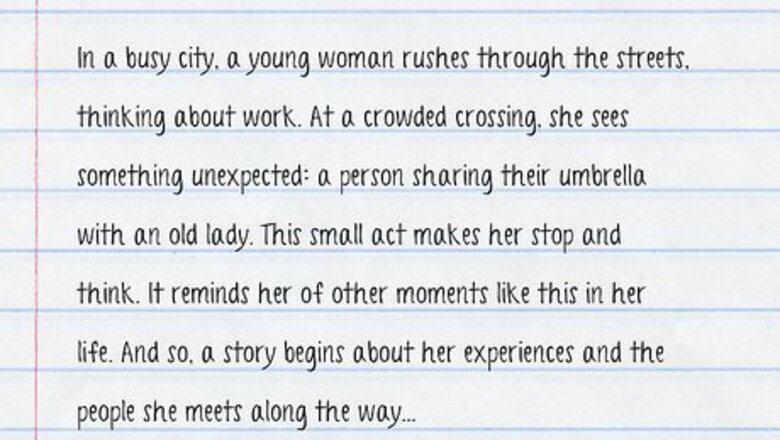
views
Fiction Ideas for Short Stories, Flash Fiction & Novels
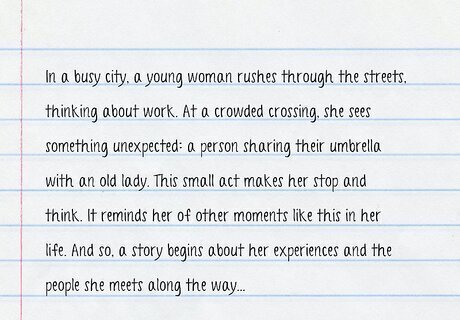
Reimagine a personal memory from someone else’s perspective. Reimagine a significant event in your life to get your creativity flowing! Maybe you fell off the monkey bars and broke your arm as a child. You could imagine this story from the perspective of your best friend, who witnessed the fall and called for help. Or, you could tell the story of the first time you met your partner, but imagine the meeting through their eyes. The options are endless!
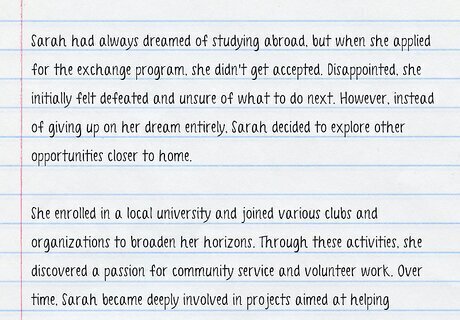
Write about what would have happened if a life event went differently. Picture yourself in an alternate universe—one where you chose a different college, moved to a different city, or ended up marrying one of your exes. What does your life look like? What things are different, and what stayed the same?
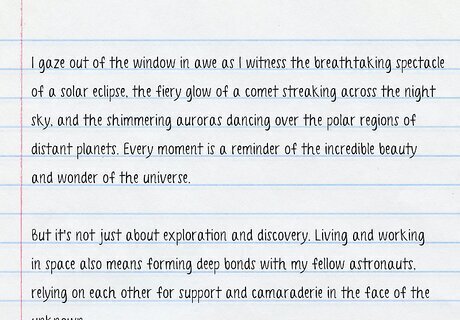
Think about a dream you had as a child, and imagine it had come true. Maybe your ultimate fantasy was becoming a popstar, or a famous actress. Or, maybe you dreamed of becoming an astronaut, or the president of the United States. Write a story about the kind of person you would be if that dream had become a reality.
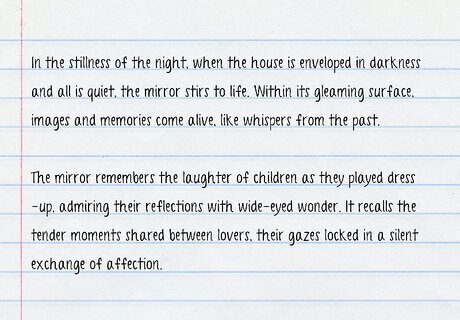
Write about an inanimate object that has human thoughts. You could tell the story of a park bench as it watches the seasons change, or an antique ring that has witnessed dozens of beautiful love stories over the years. This is a great way to start thinking outside the box and working on your creativity!
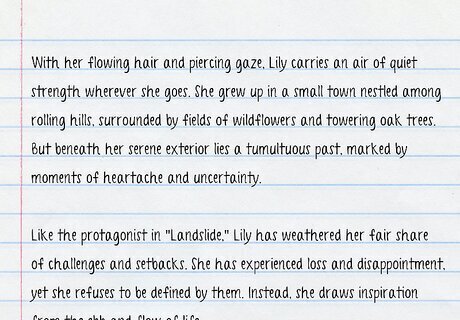
Create a character inspired by a great song. You could tell the story of the infamous “Jolene” from Dolly Parton’s country classic, which was also recently reimagined by Beyoncé. Or maybe you’d prefer to write about the mystical woman from Fleetwood Mac’s “Rhiannon,” or the heartbroken teenager from Taylor Swift’s “August.” Put on your headphones and shuffle through your playlist–you may be surprised by how much inspiration you find!
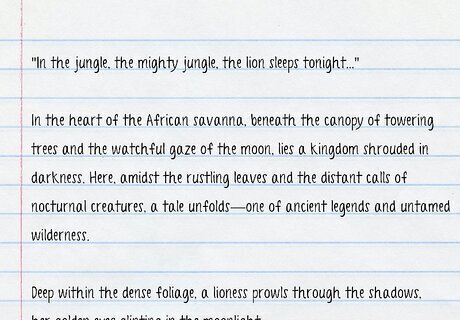
Use a great song lyric as your first line. Sometimes, the hardest part of writing a story is getting those first few words on the page. This method is a great way to bypass that problem! Just think of a song you love, and peruse through the lyrics for a sentence that would make a great opener for a story.
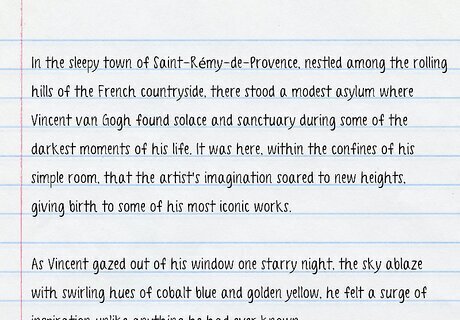
Tell a story inspired by a famous painting. To practice your descriptive skills, try writing a scene based on Vincent van Gogh’s Starry Night or Claude Monet’s Water Lilies. To practice your character writing, imagine what’s going on in the mind of Leonardo Da Vinci’s Mona Lisa, or Johannes Vermeer’s Girl with a Pearl Earring. Just think of a painting you love, and let your imagination run wild!
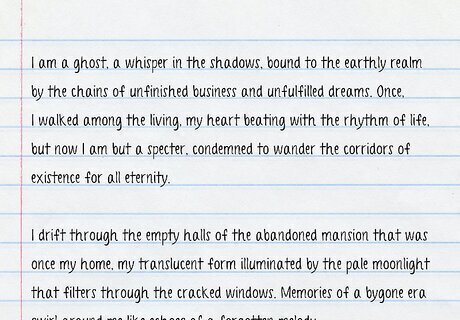
Write a story from the perspective of a ghost. Imagine a ghost from a different time period observing modern day life. What are their thoughts about the way the world has changed? Are they content in the afterlife, or do they wish they could make contact with the living? You could keep the story isolated to the ghosts’ thoughts, or imagine what would happen if they were suddenly able to communicate with someone who’s alive—whatever you prefer!
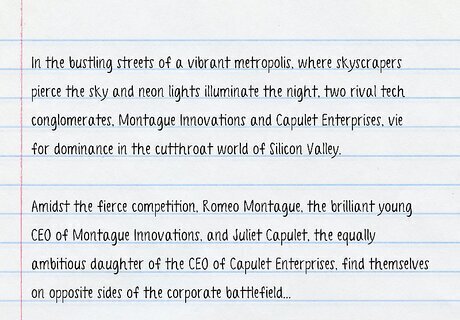
Reimagine a classic story in a modern setting. Tons of amazing pieces of art draw inspiration from classic literature. Just think of the movies 10 Things I Hate About You (based on Shakespeare’s The Taming of the Shrew), Clueless (based on Jane Austen’s Emma), or West Side Story (based on Shakespeare’s Romeo and Juliet). So, if you have a favorite classic, start brainstorming about some modern twists you could put on the story. You may be able to breathe new life into it!
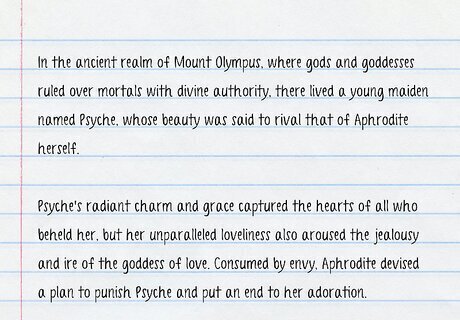
Tell a story from classical mythology. Ancient myths have served as inspiration for tons of writers, and for good reason. They’re filled with action, heartbreak, victory, tragedy—you name it! Think of the popular children’s book series Percy Jackson and the Olympians, or Madeline Miller’s best selling novels Circe and The Song Of Achilles, for example. It’s clear that there’s an audience for mythological retellings, so go ahead and try your hand at it!
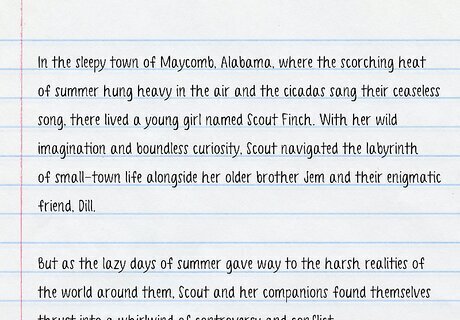
Write a different opening to your favorite novel. The first pages of a book are incredibly important. They need to immerse the reader in the setting, introduce some key characters, and get the reader hooked, so that they keep turning the pages. Imagining a different first scene for a novel is a great way to flex your writing muscles and practice these important skills.
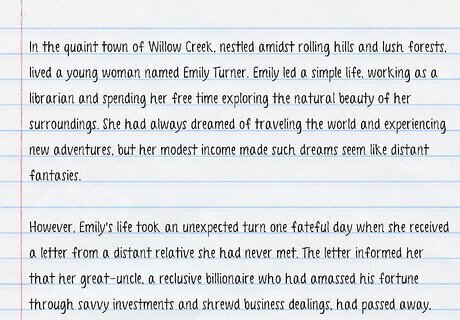
Write about a character who… Here are some ideas for characters who suddenly experience strange, thrilling, or fantastical circumstances. These ideas make good starting points for short stories and flash fiction, and once you get started, you may even feel inspired to expand your story and turn it into a novel or novella! To get started, imagine a character who… Unexpectedly inherits a fortune from a distant relative. Stumbles across a hundred-year-old love letter in a library book. Lives on a boat in the middle of the ocean. Moves into an apartment haunted by a ghost. Suddenly develops the ability to read people’s minds when touching their hands. Is Earth’s ambassador to a newly-discovered alien civilization. Buys a necklace at a flea market that transports them to a different historical period when they put it on.
Nonfiction Ideas for Blogs, Articles & Essays
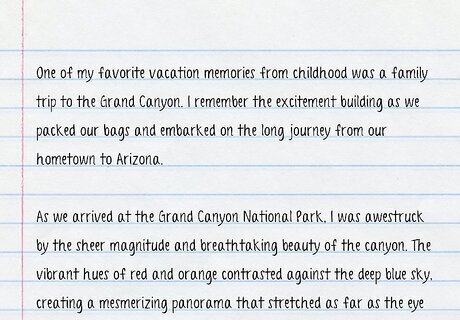
Tell the story of your favorite vacation memory from childhood. This is a great way to practice writing vivid descriptions. If you vacationed on the beach, for example, try to recreate the setting in minute detail, from the salty smell of the air to the way the sand felt beneath your feet. Or, if you went camping with your family, write about the smoky campfires, the smell of pine needles, and the delicious taste of s’mores.
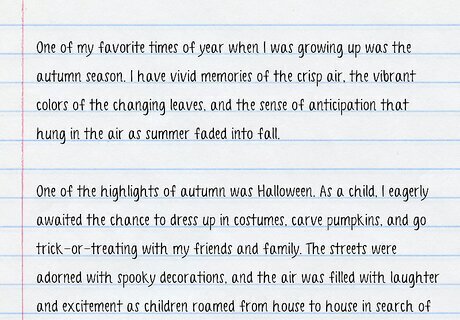
Write about your favorite time of year when you were growing up. Maybe you lived for the festive, cozy atmosphere of the winter season. Or, maybe long summer days at the pool and the smell of sunscreen were more your thing. Try to describe all the things you loved about your favorite season, and explore the reasons why you enjoyed them so much. This makes a great starting point for a personal essay or creative nonfiction piece!
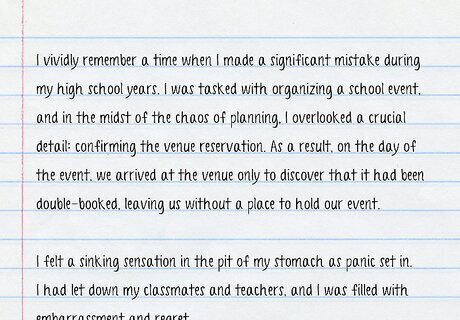
Write about a time you made a mistake, and what you learned from it. Everyone makes mistakes, and most of the time these mistakes lead to new insight, resilience, and personal growth. If you have a blog, consider sharing one of these stories with your readers. They’ll likely appreciate your vulnerability, and your insights may even be able to help one of them through a similar experience!
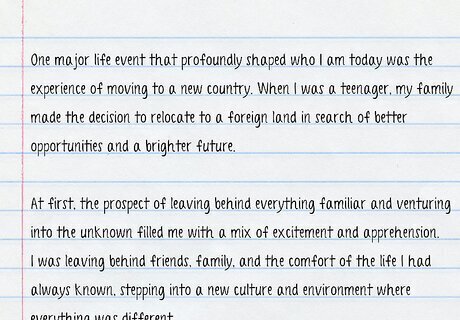
Pick a major life event, and write about the ways it shaped who you are. Looking back on your life, you’ll likely be able to pick out a few significant moments that changed everything. Choose one of these events, and write about how it altered the course of your life and made you the person you are today. Here are some examples: The day you first met your best friend The first time you fell in love The first time you got your heart broken The moment you realized what career you wanted to pursue The day you became a parent or an older sibling The first time you won an award or got recognized for a big achievement
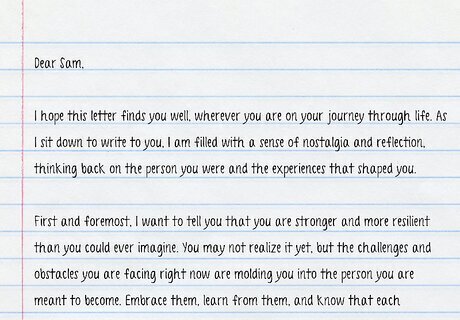
Write a letter to your past self. If you could reach back in time and say something to your former self, what would it be? What advice would you give? What comforting words would you share? Would you tell yourself to do anything differently? This is a great topic for a blog post, but it’s also perfect for a personal diary entry if you want to explore your thoughts more privately.

Write a funny message to an inanimate object or place. You could write a humorous ode to your favorite brand of hummus, or your go-to coffee shop. Or, maybe you’d like to write an angry letter to that one stoplight that’s always red on your commute home for work. Just think of an inanimate object you’d like to communicate with, and let your imagination take off!
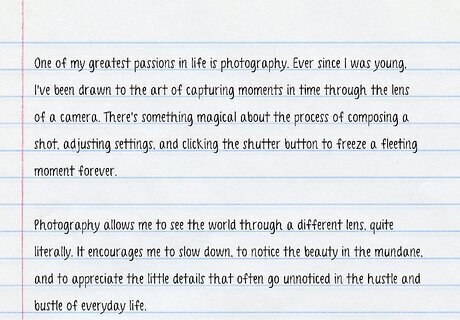
Write about a hobby or interest you’re passionate about. There’s nothing more exciting than sharing the things you love with others. Maybe you recently read an incredible book, for example. You could write a glowing review and encourage others to read it, too! Or, if you love to do something crafty, like crocheting or scrapbooking, you could write a how-to essay to help others get into these fun hobbies, too.
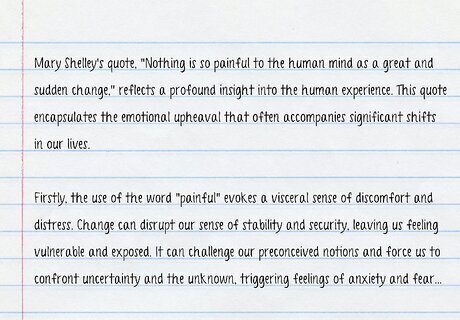
Pick an interesting quote and analyze it. If you’re having a hard time coming up with a topic to write about, try using a thought-provoking quote to spark some inspiration. You can unpack the quote’s meaning, assess whether or not you agree with it, and maybe even come up with some fascinating insights of your own! Here are some examples of quotes to get you started: “One half of the world can’t understand the pleasures of the other.”— Jane Austen “Nothing is so painful to the human mind as a great and sudden change.” —Mary Shelley “If one cannot enjoy reading a book over and over again, there is no use in reading it at all.”—Oscar Wilde “No one is useless in this world who lightens the burdens of another.”—Charles Dickens “What do we live for, if it is not to make life less difficult for each other?”—George Eliot
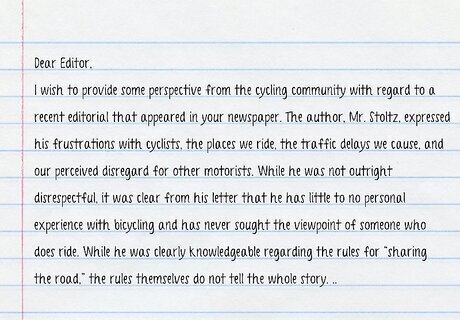
Write an opinion piece on a current event. Take a look through the headlines on popular news sites, and do some research on a topic that interests you. You can then write an article or blog post analyzing the situation and offering your opinions on it.
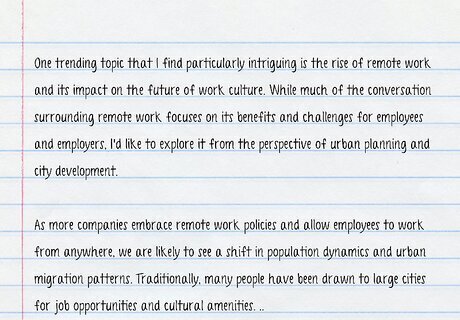
Explore a trending topic from a unique perspective. Think about a pop culture trend or event that’s captured the public’s interest lately. Do a deep dive into the topic on Google and social media, then write all about it. Since readers are likely already interested in this info, this is an especially good idea if you’re trying to gain more traffic to your blog!

If you have a blog, look to reader comments for inspiration. If you’re wondering what your readers might be interested in, go straight to the source! They may have made comments on your other posts about the things they’d like to see you write about.
Things to Write Poetry About
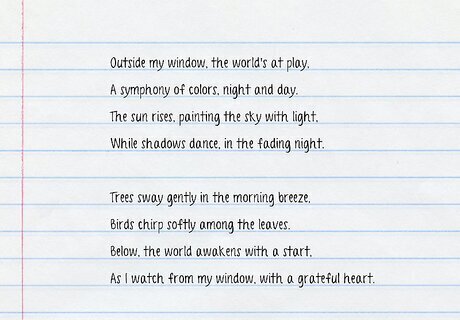
Use your senses for inspiration to write a great poem. Writing poetry is an excellent way to contemplate the world around you while also exploring your deepest emotions. Here are some ideas of things to write poems about if you’re looking for inspiration: The view from your bedroom window The way the sky looks at your favorite time of day The sounds, scents, and sights in your hometown The way you felt the first time you traveled to a faraway place The sight of the world from a plane window The way it feels to listen to your favorite song The way it felt to fall in love for the first time The sight of your best friend’s smile The way it feels to hear a loved one laugh
Things to Write Songs About

Do a deep dive into your feelings and memories to write a moving song. Songwriting is both fun and cathartic. It can help you work through your feelings during tough times, express the things you wish you’d said, or simply celebrate positive things in your life. Here are some things to write songs about to get you started: A song about your last breakup, but from the perspective of your ex A song about a vivid memory from your childhood A song about your relationship with your best friend A song about how you felt the last time you made a big mistake A song inspired by your favorite book, TV show, or movie A song from the perspective of your younger self
Tips for Overcoming Writer’s Block

Work on building your confidence. “A lot of people have obstacles between themselves and the page,” says Grant Faulkner, Executive Director of National Novel Writing Month (NaNoWriMo), and co-founder of the literary magazine 100 Word Story. “People have a creative wound, or they don’t feel confident, or they feel that somebody is going to make fun of them.” These types of insecurities can stifle your creativity before you ever put pen to paper, so it’s important to fight them. Try practicing positive self-talk to build your confidence. This means challenging your inner critic and replacing unkind thoughts about yourself with words of kindness and encouragement. Recite positive affirmations to build yourself up. You could say things like, “I am capable and worthy,” or “I have valuable ideas to share with the world.”

Become an avid reader. “I think the main exercise to learn to write well is to read a lot, to get an appreciation of language through reading,” Grant Faulkner explains. So, if you’re sitting in front of an empty page and you just can’t get the words to flow, consider taking a break to read a poem or a few chapters of a book. It may be just the inspiration you need, and it will likely improve the quality of your writing, as well!

Draw inspiration from art and the natural world. “Something I do [when experiencing writer’s block] is listen to music. I read, I go outside, I experience new scenery,” says author Alicia Cook. “Find an environment that encourages creative flow,” she says. “If you’re a true creative at heart, something will click.”

Go somewhere and observe the people around you. “As a writer, I love to just go sit at a park or a cafe or something like that and people watch,” says author, developmental editor, and writing coach Lydia Stevens. This allows you to observe how people's habits, mannerisms, and how they interact with each other. “Those little elements make for great character descriptions,” Stevens explains.














Comments
0 comment